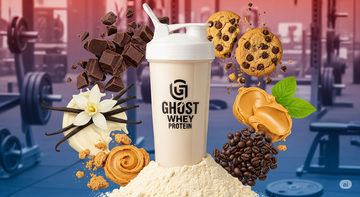Protein shakes in milk or water? Ultimate Sup Singapore will reveal the answer in this article.
Table Of Contents
When it comes to selecting a high-quality Whey supplement, there are numerous options available. Also, when it comes to taking Whey, there is growing discussion about whether to mix protein powder with milk or water. Some say you should drink it with milk, while others insist on taking it with water. But, don’t worry; this article will put all of your worries to rest.
TL;DR: Protein shakes in milk or water
Based on your fitness goals, you can decide to mix your protein shakes in milk or water. Here is a quick look at whey protein with milk and whey protein with water.

Whey Protein With Milk

If you're looking to grow muscle and bulking up, milk is a better option than water. Why is this so? Simply because you're getting more nutrients and increasing the protein content of your drink. For example, 200ml of semi-skimmed milk contains 7.2g of protein, 100 calories, 8.6g of carbohydrates, 3.6g of fat, and 9.6g of sugar. Of course, your shake will already have an excellent nutritional profile, so this will merely add to the equation. Milk's higher protein content and amino acid composition can also help to boost protein synthesis more effectively than water.
Here are some various types of milk you can add to your protein powder shakes:
- Skimmed Milk: Fat: 0.6g - Sugar: 10g - Protein: 7.2g - Carbohydrates: 10g - Calories: 74
- Semi-skimmed Milk: Fat: 3.6g - Sugar: 9.6g - Protein: 7.2g - Carbohydrates: 8.6g - Calories: 100
- Whole Milk: Fat: 7.4g - Sugar: 9.4g - Protein: 7g - Carbohydrates: 9.4g - Calories: 122
Although we do not consume protein shakes to stay hydrated, it is crucial to maintain your hydration levels throughout the day, as being hydrated assists with regular muscle function and prevents performance declines due to dehydration.
Milk is more hydrating than water. This is because milk has a greater hydration index than water, which replaces sodium lost through sweat and helps the body retain fluid better.
However, milk may take slightly longer to absorb than water. When milk is digested, it begins to thicken. This means that if you add it to your shake, the protein may take longer to absorb. Milk typically takes 3 hours to digest fully. This isn't always a negative thing because it gives your body a sustained release of amino acids and protein, but it's something to keep in mind if you want to give your body an immediate protein boost.
By adding milk to your shake, you're giving your body extra calcium and other nutrients. A typical 200ml of milk provides somewhat more than 250mg of calcium. Our daily calcium allowance is 700mg. Thus, simply adding milk to your whey protein shake will make it easier for you to reach your daily calcium requirement. Calcium is a well-known nutrient that keeps your bones strong. It also plays critical roles in blood clotting, energy-yielding metabolism, muscle function, and cell division.
Whey Protein With Water

Water is the more accessible, cheaper, and more convenient alternative over milk in a shake. Water, for example, is virtually nothing, so adding it to your shake will add no extra calories, carbohydrates, fats, or sugars, so what you see in the pouch will be what you receive in your shake. If you're on a calorie-controlled diet, this is ideal because you know precisely what you're getting.
When compared to milk, water may be ingested and absorbed exceptionally rapidly. Studies have shown that water is absorbed into the bloodstream within five minutes, implying that the protein can be delivered to your needed areas considerably faster than milk.
Protein Powder Better With Milk Or Water?

Protein shakes in milk or water are better for you? The most significant difference between blending Whey with milk or water is your calorie intake and digestion rate. The liquid you choose to mix Whey with is determined by your individual fitness goals, such as whether you want to gain weight, lose weight, or build lean muscle mass.
Whey protein is typically around 100 calories per serving, with very little or no carbohydrate or fat. If you're on a ketogenic diet (low carb, high fat) or a calorie-restricted diet to lose weight, you should mix Whey Protein with water because it won't contribute calories to your diet.
If you're not concerned about calorie consumption and want to gain weight along with muscle mass, whey with milk is an option to consider. Combining a glass of whole milk with a serving of Whey adds roughly 100 calories. This is particularly beneficial for skinny men who desire to gain muscle and weight.
Suppose you don't exercise and only take Whey to meet your protein needs, the rate of protein digestion shouldn't affect you too much. You can drink it with milk or water, whatever you want. All you have to do is make sure you meet your daily protein requirements.
But, when you follow a regular workout, you may want to take whey protein with water instead of milk. Your muscles are depleted of amino acids after an exercise and must be replenished to aid recovery and muscle protein synthesis. This situation requires a protein that acts quickly. That's why consuming protein shakes in water, in this case, will be more appropriate.
Benefits Of Protein Shakes
Here are five benefits of drinking protein shakes.
- Protein shakes support muscle growth
- Protein shakes pack in the protein
- Protein shakes help with weight management
- Protein shakes are convenient.
Now, Ultimate Sup Singapore guesses you have your answer to whether to mix protein shakes in milk or water. If you have another thought, don't hesitate to share with us by leaving a comment below. Or, to receive further support, you can drop by our supplement store in Singapore right away.
Related Articles:










